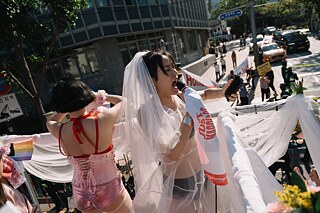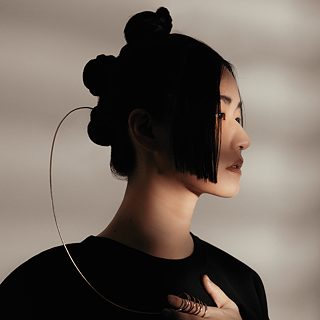Lang Lee:
A voice against discrimination
Please introduce yourself briefly.
Hello, my name is Lang Lee. I was born in 1986 and I currently live and work as an artist in Seoul, South Korea. In my creative process, I work with various media such as songs, lyrics, film, and painting. Through my art, I aim to address issues such as poverty, anguish, death, grief, fear, and loneliness, and connect with a diverse range of people.
I was under the impression that you are not part of a sexual minority, yet you are one of the loudest voices in the fight for queer rights. You often advocate for the positions of people who are discriminated against, not just because of their sexual orientation. What is your motivation?
I have never publicly spoken about whether I belong to a sexual minority or not. However, I believe that everyone, even if it's just a small part of them, can be considered “queer”.
I am interested in the stories of different minorities, including queer people, simply because “they exist”. Their stories are often overlooked and underrepresented in our society. It seems that only the stories of young, healthy, outgoing, or wealthy individuals are frequently told. I think that the stories of the unheard need to be shared more often and more loudly.
I believe that artists have a responsibility to be the first to approach these stories. It is the role of artists to look at existing things in new ways, from different angles, and to introduce new perspectives and ideas.
The sight of you giving a concert on the truck at the Seoul Queer Parade 2024 under the motto “Marriage for - Just Marriage” made a big impression on me. How did that come about? Based on that, do you think same-sex marriage will be legalized in Korea? What activities and efforts are you putting into it?
I believe that the patriarchal and Confucian-influenced system of marriage does not reflect the diverse needs of people in today's world. I don't support it. However, I strongly believe that same-sex couples should have the right to access this system, despite its flaws. Everyone should have the right to live their life with the person they love and receive legal protection for their relationship. That's why I support the fight for legalization. I expect same-sex marriage to be introduced because the law and society should be shaped according to the diverse needs of the people living at the time. The Seoul Queer Parade saw 150,000 people march, which shows that we are not talking about a distant future.
Your album “There is a Wolf (늑대가 나타났다)” won “Album of the Year” and “Best Folk Album” at the Korean Music Awards in 2022. The album includes a re-recording of the single “The Generation of Tribulation" (original title 환란의 세대), featuring a collaboration with the Unnie Choir (아는언니들) - a choir of women who reject marriage or identify as queer or feminist. This new version evoked entirely different emotions compared to the original. What inspired you to pursue this collaboration, and what was your experience like?
In today's society, minorities are obviously discriminated against. I know that it takes great courage to openly say that as a choir you sing about “the rejection of marriage, being queer and feminism”. That's why I wanted to work with this courageous choir. Many members of the choir do not publish their names or faces. They live in very different circumstances in their everyday lives, and this could lead to threats or disadvantages. I think this is also the reason why there are hardly any actors, celebrities or famous people in Korean society who have publicly come out as queer.
Sadly, if you are in the queer community, you often attend funerals. If you show just a little interest, you can immediately see how common suicide and suicidal thoughts are among queer youth and young people. One unique and precious life after another is snuffed out, and I find that extremely sad and unfortunate. I don't want to have to say goodbye to anyone anymore. That's why I recorded the song “The Generation of Tribulation”. I sincerely hope the brave voices of the Unnie Choir immortalized in the song will be heard and reach someone who is fighting a lonely battlesomewhere in secret.
When you were invited to the Seoul Music Awards, an award ceremony for the K-pop industry, you conveyed the message “Anti-discrimination law now” in sign language during your performance. Some people argue that implementing an anti-discrimination law could impose significant restrictions on freedom of expression. How do you respond to these objections?
The concept of “freedom” does not imply that everyone can live as they wish. We coexist in a community, so we must exercise our “freedom” with a strong sense of responsibility. Can freedom truly exist if it excludes minority groups? In today's society, freedom is unequally distributed. We need to redefine what true freedom and equality means for all individuals in today's world. In my opinion, the first step towards this is implementing an anti-discrimination law.
When your older sister passed away, you delivered a powerful speech against gender discrimination at her funeral. Can you share more details about this?
It was not a “funeral performance” to criticize anything. I was just trying to perform a funeral in accordance with the wishes of my deceased sister, our family and myself in the face of a sudden death and in the context of a funeral process that we had not been able to prepare.
During the process, I personally experienced how patriarchal and gender discriminatory the current funeral culture is. At the beginning, I was told that as a woman, I could not serve as a representative of the next of family and wear the appropriate armband. My family and I believed that I was the best person to represent the family, and it was unfair that I couldn't do so just because of my gender. I was in disbelief.
I had no choice but to tell the funeral home employee, who refused to give me the armband, that I was not a woman. Therefore, I assumed the role of family representative and decorated the altar with things my sister liked when she was alive - her earrings, a tiara, a magic wand, and a gorgeous dancing costume with gold fringe.
My sister worked as a special education teacher but also enjoyed Latin American dances as a hobby for almost 20 years. So, at the end of the funeral, the dance group she belonged to performed to one of her favorite dance performances as planned. I believe that a funeral doesn't have to be quiet and serious; it should reflect the wishes of the deceased and the people who spent time with them. I was grateful to be able to organize my sister's funeral with these people and cry, laugh, and spend time together.
You create stories, whether in the form of song lyrics or manhwa dialogues, and use them to communicate messages to the public. What message would you like to communicate today, in 2024?
It seems that fewer people nowadays claim to have a comfortable life. It feels as if everyone is battling challenges, big and small, on a daily basis. Despite living in a highly developed and civilized society, there is a growing number of individuals who experience loneliness, suffering, fear, and distress. Why is this happening? Could it be due to a meritocracy that disregards those who are not wealthy, powerful, or intelligent as “useless”? To investigate, I follow the news, read books, explore different locations, and make an effort to connect with a wide range of individuals.
I admire people who are aware of their weaknesses, and who constantly question themselves while making an effort to understand the weaknesses of others. I appreciate the effort such individuals make to connect with others and their willingness to share. To me, this warmth and flexibility is what makes the human species so beautiful. A flexible state of mind is, in my opinion, the strongest state.
I strongly believe that everyone can accept those who are different from themselves, without passing judgment, and can live together with them. Embracing the unknown and the foreign is important, especially considering the challenges we all face in today's world. I would like to encourage us to praise and support each other simply for navigating our lives. Lastly, I want to emphasize that every person's life is incomparable and unique, and therefore valuable and worth protecting.
Hello, my name is Lang Lee. I was born in 1986 and I currently live and work as an artist in Seoul, South Korea. In my creative process, I work with various media such as songs, lyrics, film, and painting. Through my art, I aim to address issues such as poverty, anguish, death, grief, fear, and loneliness, and connect with a diverse range of people.
I was under the impression that you are not part of a sexual minority, yet you are one of the loudest voices in the fight for queer rights. You often advocate for the positions of people who are discriminated against, not just because of their sexual orientation. What is your motivation?
I have never publicly spoken about whether I belong to a sexual minority or not. However, I believe that everyone, even if it's just a small part of them, can be considered “queer”.
I am interested in the stories of different minorities, including queer people, simply because “they exist”. Their stories are often overlooked and underrepresented in our society. It seems that only the stories of young, healthy, outgoing, or wealthy individuals are frequently told. I think that the stories of the unheard need to be shared more often and more loudly.
I believe that artists have a responsibility to be the first to approach these stories. It is the role of artists to look at existing things in new ways, from different angles, and to introduce new perspectives and ideas.
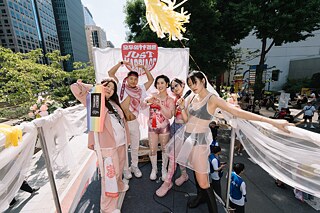
I believe that the patriarchal and Confucian-influenced system of marriage does not reflect the diverse needs of people in today's world. I don't support it. However, I strongly believe that same-sex couples should have the right to access this system, despite its flaws. Everyone should have the right to live their life with the person they love and receive legal protection for their relationship. That's why I support the fight for legalization. I expect same-sex marriage to be introduced because the law and society should be shaped according to the diverse needs of the people living at the time. The Seoul Queer Parade saw 150,000 people march, which shows that we are not talking about a distant future.
Your album “There is a Wolf (늑대가 나타났다)” won “Album of the Year” and “Best Folk Album” at the Korean Music Awards in 2022. The album includes a re-recording of the single “The Generation of Tribulation" (original title 환란의 세대), featuring a collaboration with the Unnie Choir (아는언니들) - a choir of women who reject marriage or identify as queer or feminist. This new version evoked entirely different emotions compared to the original. What inspired you to pursue this collaboration, and what was your experience like?
In today's society, minorities are obviously discriminated against. I know that it takes great courage to openly say that as a choir you sing about “the rejection of marriage, being queer and feminism”. That's why I wanted to work with this courageous choir. Many members of the choir do not publish their names or faces. They live in very different circumstances in their everyday lives, and this could lead to threats or disadvantages. I think this is also the reason why there are hardly any actors, celebrities or famous people in Korean society who have publicly come out as queer.
Sadly, if you are in the queer community, you often attend funerals. If you show just a little interest, you can immediately see how common suicide and suicidal thoughts are among queer youth and young people. One unique and precious life after another is snuffed out, and I find that extremely sad and unfortunate. I don't want to have to say goodbye to anyone anymore. That's why I recorded the song “The Generation of Tribulation”. I sincerely hope the brave voices of the Unnie Choir immortalized in the song will be heard and reach someone who is fighting a lonely battlesomewhere in secret.
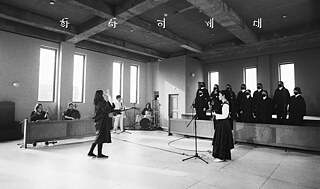
The concept of “freedom” does not imply that everyone can live as they wish. We coexist in a community, so we must exercise our “freedom” with a strong sense of responsibility. Can freedom truly exist if it excludes minority groups? In today's society, freedom is unequally distributed. We need to redefine what true freedom and equality means for all individuals in today's world. In my opinion, the first step towards this is implementing an anti-discrimination law.
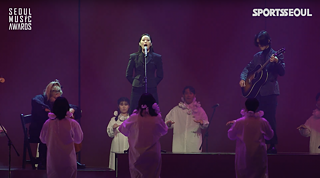
It was not a “funeral performance” to criticize anything. I was just trying to perform a funeral in accordance with the wishes of my deceased sister, our family and myself in the face of a sudden death and in the context of a funeral process that we had not been able to prepare.
During the process, I personally experienced how patriarchal and gender discriminatory the current funeral culture is. At the beginning, I was told that as a woman, I could not serve as a representative of the next of family and wear the appropriate armband. My family and I believed that I was the best person to represent the family, and it was unfair that I couldn't do so just because of my gender. I was in disbelief.
I had no choice but to tell the funeral home employee, who refused to give me the armband, that I was not a woman. Therefore, I assumed the role of family representative and decorated the altar with things my sister liked when she was alive - her earrings, a tiara, a magic wand, and a gorgeous dancing costume with gold fringe.
My sister worked as a special education teacher but also enjoyed Latin American dances as a hobby for almost 20 years. So, at the end of the funeral, the dance group she belonged to performed to one of her favorite dance performances as planned. I believe that a funeral doesn't have to be quiet and serious; it should reflect the wishes of the deceased and the people who spent time with them. I was grateful to be able to organize my sister's funeral with these people and cry, laugh, and spend time together.
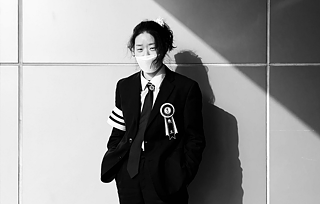
It seems that fewer people nowadays claim to have a comfortable life. It feels as if everyone is battling challenges, big and small, on a daily basis. Despite living in a highly developed and civilized society, there is a growing number of individuals who experience loneliness, suffering, fear, and distress. Why is this happening? Could it be due to a meritocracy that disregards those who are not wealthy, powerful, or intelligent as “useless”? To investigate, I follow the news, read books, explore different locations, and make an effort to connect with a wide range of individuals.
I admire people who are aware of their weaknesses, and who constantly question themselves while making an effort to understand the weaknesses of others. I appreciate the effort such individuals make to connect with others and their willingness to share. To me, this warmth and flexibility is what makes the human species so beautiful. A flexible state of mind is, in my opinion, the strongest state.
I strongly believe that everyone can accept those who are different from themselves, without passing judgment, and can live together with them. Embracing the unknown and the foreign is important, especially considering the challenges we all face in today's world. I would like to encourage us to praise and support each other simply for navigating our lives. Lastly, I want to emphasize that every person's life is incomparable and unique, and therefore valuable and worth protecting.
